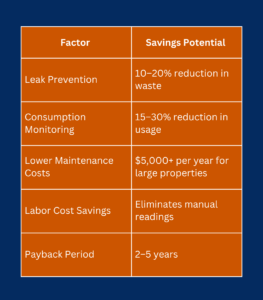-
0 Comments
The Economics of Smart Water Metering: Is It Worth the Investment?

Water is a critical yet often undervalued resource in commercial properties. Whether managing an office building, industrial facility, or multi-unit residential complex, efficient water usage directly impacts operating costs, sustainability efforts, and regulatory compliance.
Traditional water meters provide basic consumption data, but they lack the real-time monitoring and analytical capabilities of smart water meters. With increasing water costs and growing environmental concerns, many businesses are considering smart water metering as a long-term investment.
But is the upfront cost of these devices justified by the savings and benefits they bring? This article provides a detailed cost-benefit analysis of smart water metering to help facility managers, property owners, and businesses determine whether it’s the right investment.
What Is Smart Water Metering?
Smart water meters are digital devices that provide real-time data on water consumption. Unlike traditional meters, which require manual readings, smart meters use wireless communication to transmit usage data to a central platform. This allows for automatic tracking, leak detection, and detailed consumption analysis.
How Smart Water Meter Work:
Data Collection
Measures water flow in real time.
Wireless Transmission
Sends data via cellular, radio, or Wi-Fi.
Cloud Based Monitoring
Displays insights through dashboards and mobile apps.
Alerts & Automation
Detects anomalies and send notifications.
The Costs of Smart Water Metering
Upfront Investment
The initial cost of installing smart water meters varies depending on property size, meter type, and integration complexity. Key expenses include:
Hardware Costs – Smart meters range from $200 to $1,500 per unit (EPA, 2023).
Installation Fees – Professional setup costs $150–$500 per meter, depending on existing infrastructure.
Software & Data Management – Monthly subscriptions for monitoring platforms cost $5–$20 per meter (NRDC, 2023).
Long-Term Savings
While the upfront costs may seem high, smart water meters can lead to significant financial benefits, including:
-
Leak Detection & Prevention – Studies show that 10–20% of a building’s water use is wasted due to leaks (USGS, 2023). Smart meters detect leaks instantly, preventing costly water loss.
-
Lower Utility Bills – Real-time monitoring helps businesses reduce consumption by 15–30%, leading to thousands of dollars in annual savings (Water Research Foundation, 2023).
-
Reduced Labor Costs – Eliminates the need for manual meter readings, saving hours of labor expenses.
-
Optimized Water Usage – Data analytics help identify inefficiencies, such as excessive irrigation or overuse in restrooms.
The Environmental & Compliance Benefits
Smart water meters offer advantages beyond cost savings, including:
1. Sustainability & Conservation
Reduces water waste, supporting corporate sustainability goals.
Helps businesses comply with local water conservation regulations.
Contributes to LEED certification and other green building standards.
2. Regulatory Compliance
Many cities require water efficiency reporting for large buildings.
Some regions offer tax incentives for businesses adopting smart water solutions (DOE, 2023).
Return on Investment (ROI) Analysis
The return on investment (ROI) for smart water meters depends on installation costs, water rates, and usage patterns. Here’s a breakdown of potential savings:

For most businesses, the investment pays for itself within 2–5 years, with continued savings afterward.
How to Finance Smart Water Metering
Many businesses worry about upfront costs, but there are financing options available:
Government Grants & Rebates – Some states offer incentives for water conservation projects.
Utility Company Programs – Certain providers offer rebates for installing smart meters.
Green Financing – Loans or tax credits for businesses implementing sustainability initiatives.
Performance-Based Contracts – Some vendors offer financing where cost savings cover the investment.
Is Smart Water Metering Worth the Investment?
The answer depends on your facility’s water usage, budget, and efficiency goals. However, the data overwhelmingly supports the benefits:
✅ Immediate savings from leak detection
✅ Long-term cost reductions in water bills and labor
✅ Improved regulatory compliance and sustainability metrics
✅ Faster ROI compared to traditional water management methods
For businesses looking to cut costs, enhance efficiency, and support environmental initiatives, smart water metering is a sound investment.
Take Action: Explore Your Options Today!
Thinking about making the switch to smart water metering? Contact our team today to explore your options and start saving.

